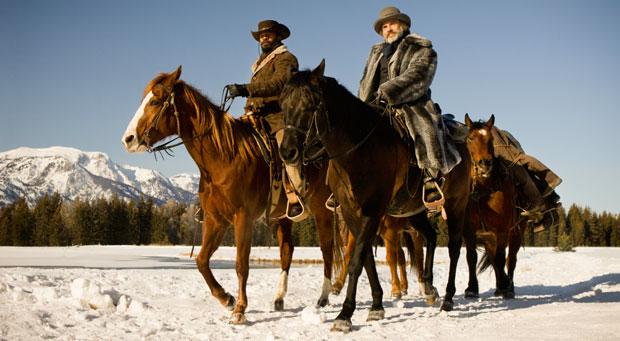
The Weinstein Company
180 min., dir. by Quentin Tarantino, with Jamie Foxx, Christoph Waltz, and Leonardo DiCaprio
With everything he’s presented to the world, Quentin Tarantino has fed his audiences a vision of what he grew up adoring. Injecting aspects of the Spaghetti Western into all of his films, he’s finally sat down and pumped out his own full-length version of the genre. Sticking with his style-over-substance persona, Tarantino does something with Django Unchained that he’s never really done before: he made a comedy.
Dr. King Schultz (Christoph Waltz) is a bounty hunter on the lookout for a big score. The only problem is that he has no idea who his next targets look like. He hears word that a slave, Django (Jamie Foxx), recently sold at an auction nearby, once was enslaved on a plantation for the three brothers he is in search of. Schultz spares no expense to free Django in hopes that the now-free slave will help him hunt the men down. Noticing that Django has a natural talent for the bounty hunting business, Schultz offers him a deal: if Django teams up with Schultz throughout the winter collecting bounties, he’ll help Django rescue his wife from the evil Calvin J. Candie (Leonardo DiCaprio), owner of the Candie Land plantation. Despite blood, guts, and exploding genitalia, nothing will stop Django from saving his love.
One might think there’s nothing funny that could be done with a story about slavery. Comedians have had plenty of jokes and skits about the subject — but a three-hour, star-studded, box office draw? Django Unchained doesn’t shy away from its morbid bits and tragic background, but it battles through the world’s preconceived notions by sticking to two simple principles: empower Django at all times, and lay on the laughs. Mel Brooks once commented on his obsessive use of Hitler in his films, saying, “By using the medium of comedy, we can try to rob Hitler of his posthumous power and myths.” While I don’t think Django Unchained aims to send a specific message about the era, it certainly uses its humor to augment the viewer’s experience of sitting through such a long tale set against a shameful backdrop. Still, it does directly poke and prod some of history’s most unsavory groups.
Many people believe Inglorious Basterds to be Tarantino’s best film, even believing the film’s final line of dialogue was Tarantino’s own admission that he agrees. Django Unchained silently proves that theory to be correct. Pulling out all the stops from casting, outrageous deaths, and the touchy subject matter, it’s obvious that Tarantino was out to have some fun, and nothing else. From Bruce Dern to Franco Nero (the actor who played Django in the film the script was first inspired by), almost every role is played by a big name — some of them who are literally background actors. With music from the original Django scoring master/Spaghetti Western musical legend Ennio Morricone and an assortment of hip-hop from icons ranging from Rick Ross to Kanye, Django Unchained is Tarantino’s playground.
Jamie Foxx’s Django is unchained in more than just the literal sense. He’s a wildcard whose emotions bubble up at the mere mention of his wife. Foxx has his moments of unabashed glee and foolishness, but apart from the title alone, Django is the unshakable, serious cog of the film. Leonardo DiCaprio surely had fun playing the dastardly Monsieur Candie (as he likes to be called), but as always, there are times — be it less often here — that he loses his accent.
Once again, Christoph Waltz is the most interesting character on screen. Not so much for his performance — though it is fun — but because Schultz presents an interesting dichotomy of a man who willingly kills for money with no quarrels, but squeamishly can’t handle the true horrors that exist around him. For me, Tarantino’s works may have always lacked a certain level of substance, but Schultz as a character offers a lot of opportunity for great chatter about how we still view our society’s faulty past and present.
Django Unchained has everything it takes to be a crowd-pleaser, yet, it doesn’t all come together in the end. I laughed harder during the “Klansman” hood argument scene than I have at any other movie this year, but I’m still bothered by the film’s pacing that starts out with a bang but fizzles in the film’s Lord of the Rings-style multiple-ending points. The events of the first half of the film are necessary to develop the story, but could have been shortened by 45 minutes and still have delivered the same impact. Where long story development plays an important part in previous Tarantino films, it just tacked on more time for no reason here.
I’m a tough customer to please, but the Tarantino faithful will be thrilled beyond belief by the time the lights come up, and similarly awed by the slight pull-away Tarantino has taken from his previous films. “Unchained” is the perfect word to describe everything about this movie — it’s out there and completely unapologetic in every way, and it will drive people crazy.
—
Matthew Schuchman is the founder and film critic of Movie Reviews From Gene Shalit’s Moustache and a contributor to Den of Geek.